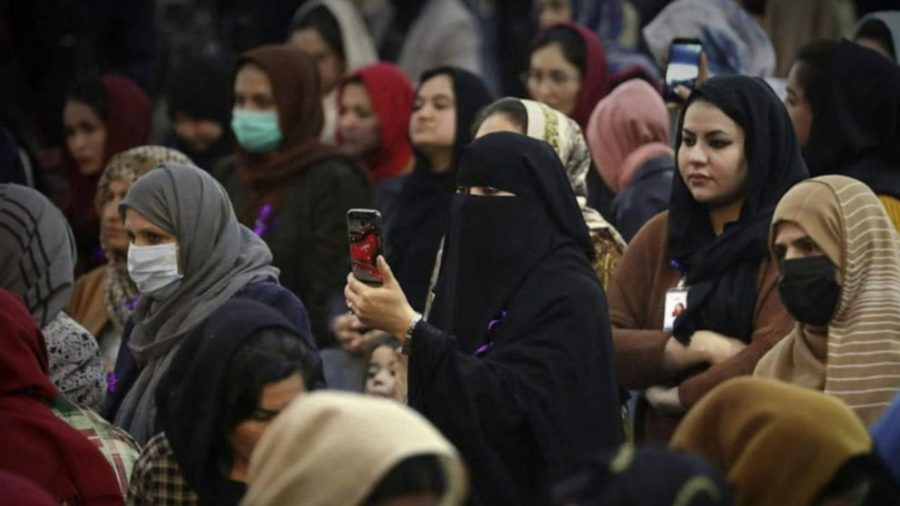NEWS ANALYSIS: With the Taliban back in control, Afghanistan’s women facing loss of recently gained rights
Many Afghani women fear the loss of their freedoms now that the Taliban has retaken control of Afghanistan.
Gender inequality has been a major social issue in the United States and in other countries for over 100 years. For example, women in developed countries can be paid less than their male counterparts doing the same job. However, gender inequality in Afghanistan is different; it is much more extreme.
When President Biden withdrew U.S. forces from Afghanistan, the Taliban re-took control over the country in a matter of days, and many rules were reinstated for Afghani women. The women in Afghanistan are expecting the loss of their many freedoms and rights in the upcoming weeks. One thing is for sure, the freedom Afghani women and girls had enjoyed over the past 20 years are going to be significantly curtailed.
The Taliban has not held power in Afghanistan since the 1990’s. Under their “new” rule, they claim that they will now be less extreme towards women and girls. They are telling the world that they will offer women more freedoms; however, many people in the rest of the world and even in Afghanistan do not believe this to be true. Taliban spokesperson Zabihullah Mujahid stated that the new and improved Taliban will allow certain freedoms to women, within the limits of Islam.
According to the Associated Press, Mujahid “promised the Taliban would honor women’s rights within the norms of Islamic law, without elaborating. The Taliban have encouraged women to return to work and have allowed girls to return to school, handing out Islamic headscarves at the door.”
However, most people still question how the Taliban’s limits, which are derived from Islam, will effect the female citizens of the country. Many people are wondering if women will be allowed to have jobs and receive an education.
“The Taliban have pledged to respect women’s rights ‘within the limits of Islamic law.’ It is that caveat that should concern Afghan women since the Islamic law the Taliban follow is a very strict and misogynistic interpretation of the text,” explains Olympic Heights AICE Global Perspectives teacher Mr. Michael Taylor.
“The Quran is actually quite vague on the exact role of women in society,” Taylor continues. “It claims women and men were created equally but then, as with most religious texts, the specifics are often interpreted differently.”
OH AICE Psychology teacher Dr. Seth Alper agrees with Taylor’s assessment, stating it is “very likely that [Afghani] women will be oppressed in numerous ways as they were before, and it may be worse with the notion of retribution for the years of personal freedoms when the Taliban was not in power.”
Since the early 2000s, when the Taliban was removed from power, the literacy and schooling rate for Afghani women, and all Afghanis in general, has significantly increased. However, according to the UNESCO Institute for Lifelong Learning (UIL), which has provided technical support to the government of Afghanistan since 2012, there is still a large gender gap in the literacy rate.
Afghanistan has a very low literacy rate at a mere 43 percent. The Population Reference Bureau (PRB) states, “Some 47 percent of Afghan men and a tiny 15 percent of women can read and write, according to the UN Children’s Fund (UNICEF).” Sadly, women and girls in Afghanistan wonder if they will be allowed to continue to go to school, even though the Taliban promised they would be. Also, women are concerned that they will not be able to work anymore.
The gross national income for women has also greatly increased in Afghanistan; in fact, it almost tripled, in the past 20 years. This is due to women being allowed to work and to even hold jobs in leadership and the government.
Under the rule of the “old” Taliban, women were not able to work or even walk outside without a male escort. The male escort rule has once again been reinstated. As well as having a male escort, women must also be covered in the traditional Islamic clothing, “like proper Muslim women,” according to the Taliban. The Taliban says that it is for Afghani women’s safety: however, many believe the people that the women need safety from are the members of the Taliban.
In order to gain and maintain control of the country of Afghanistan, the Taliban uses acts of violence and homicide against women and activists that oppose their beliefs. Many Afghani women have said that they are fearful and just waiting for the Taliban to come hurt or kill them and their families. The Taliban uses acts of violence and homicide against women and activists that oppose their beliefs. This especially applies to women in power.
One woman, Salima Mazari, an Afghani governor, has been taking a stand against the Taliban. Mazari has been openly criticizing the Taliban to international news outlets. She has also been taking a stand against the Taliban as a member of a local militia group which opposes the Taliban. Her current whereabouts are unknown as she is assumed to have been captured by the Taliban. It is likely that the Taliban may have silenced another voice that has spoken out in opposition.
“In an interview published with the Associated Press on Aug. 14, Mazari expressed no confidence that the Taliban would keep its promises to be more moderate,” People Magazine reported. “‘There will be no place for women,’ she told the AP. ‘In the provinces controlled by the Taliban, no women exist there anymore, not even in the cities. They are all imprisoned in their homes.’”
As societies progress around the world, Afghanistan is regressing and stripping women of basic human rights. The belief that women are inferior to men is ingrained in the Taliban. It will destroy everything that Afghani women have worked towards over the last two decades. The future looks bleak and the empty promises of the current, “less extreme” Taliban have already limited women’s rights. Afghanistan’s citizens are worried for their safety, education, and freedom, and rightfully so.

















